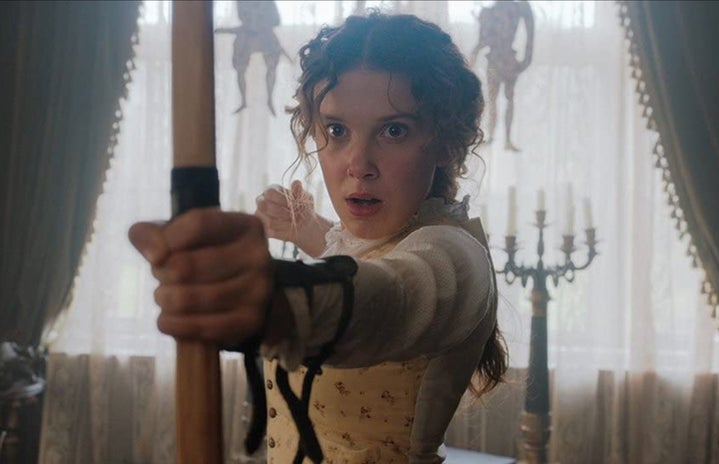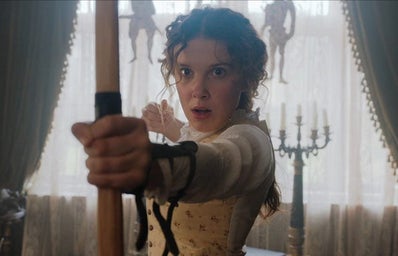BEFORE WE BEGIN, a quick note: these opinions are mine and are not representative of Pepperdine nor Her Campus as a whole. Disagreements are welcome. Also, mild spoilers ahead for Enola Holmes and Jane Eyre.
Hot take: I didn’t like Enola Holmes.
You know, that Netflix movie? With Millie Bobby Brown? Yes, I know it came out over a month ago, and given what’s happened since then, a month feels like eons. But for whatever reason, I haven’t been able to get the dang movie off my mind. It checks all of the boxes for things I generally like about movies: an interesting historical setting with cool costumes, fighting sequences, a halfway decent plot, and a strong female protagonist. The movie was even given a 91% fresh rating on Rotten Tomatoes. So why didn’t I like it?
The short answer: it felt too… preachy. But a statement like this is problematic, because the message Enola Holmes delivers should be addressed. In the movie, Enola is the assertive, intelligent, and feisty younger sister of Sherlock and Mycroft Holmes who embarks on a search for her mother, who has mysteriously disappeared. She must do so without the help of her older brothers, who are either apathetic (Sherlock) or strongly opposed (Mycroft) to her doing so. At its core, Enola Holmes is a girl power narrative that directly addresses the inequities of Victorian English society and, by extension, our own. A review posted by News 18 perfectly summarized this idea:
“The movie does want to change the world, at least in the limited sense of changing Sherlock Holmes. Holmes is one of the most iconic characters in literature, and he stands for a certain kind of male, moneyed Britishness: brilliant, reserved, unemotional, ruthlessly rational, masterful and mastering. When Enola Holmes says that Sherlock is pompous, politically apathetic, casually sexist and not quite as clever as he thinks he is, the film is critiquing both him and the worldview he represents, in which brilliant patriarchs police their inferiors.”
So here’s a deep question: is my dislike for Enola Holmes rooted in internalized sexism? Do I just not like seeing brilliant patriarchs being challenged? Do I have a problem with feisty, strong female protagonists?
Well, no. Shoot, I love a good strong female character. I’ve read The Hunger Games series at least three times. I oogle over River Song, the insanely smart, booty-kicking companion of the Doctor in Doctor Who. My problem with Enola Holmes isn’t with Enola’s willingness to challenge her surroundings. It’s how she does it that bothers me.
To illustrate my point, let’s talk about a girl power narrative I do like: Charlotte Bronte’s Jane Eyre. You know, that one book that your English teacher talked about in high school? Set in the 1840s, Jane is an orphan-turned-governess who gets repeatedly tossed around by people in her life who despised her for being “poor, plain, and little.” See, back in Victorian England, women were only worth something to society if they had beauty, power, or status—things that Jane had never been granted. Despite this, Jane is able to challenge her male superiors (if you’ve read the book, Brocklehurst, Rochester, and St. John) and maintain her autonomy, eventually achieving power and status through means of her own. In other words, Jane Eyre poses a challenge to Victorian values by showcasing her as a strong, independent woman who don’t need no man.
The 2020 reader may be quick to criticize Jane Eyre, and I understand why. Though her actions and words do question the status quo, they never directly challenge it. Jane is no sassy queen or jiu-jitsu master like Enola: in reality, Jane never abandons her “duties” as a student, woman, governess, and (much later) wife. Rather, Jane passively challenges the status quo through her quick wit, strong moral code, and stubborn refusal to give in to the wills of her superiors. Understanding Charlotte Bronte’s social critique takes a great deal of interpretation on the reader’s part—hence why the book is taught in high school English classes. Because Jane’s resistance is so passive and implicit, many readers today may argue that Bronte’s challenge to sexist social norms isn’t enough. Some have even rejected it as a feminist novel altogether.
On the other hand, Enola Holmes is a very explicit societal critique. Heck, Enola spends half of the movie directly addressing the audience! Her challenge to social norms is often so direct that she finds herself in a fistfight with a middle-aged male assassin. The cheesy story and scripted lines make the message clear: nobody messes with strong women.
But the clearness of the message is also why it feels so preachy. It’s a classic example of show, don’t tell: a storytelling blunder in which writers tell the audience to feel a certain way rather than inciting them to feel that way organically. Enola spends a great deal of her time telling the audience, her brothers, and people she meets how strong she is and how she feels the need to “save” those in need. The movie’s storytelling style leaves no room for interpretation: rather than showcasing Enola’s heroic deeds and allowing us to make our own conclusions, we are told (literally told, like, breaking the fourth wall) that society is bad and that Enola is a hero. I think my reaction against the movie is largely a product of my distaste for being told how to feel about something.
Enola Holmes is truly a product of its time. In our current politically polarized age, societal issues are rarely presented in a way that leaves room for interpretation. Rather, we are told (by all sorts of entities, on all sorts of issues) that thinking a certain way about something is the only way to be a good, moral person. My love for Jane Eyre is really a love for the dignity of interpretation: I dislike being told what to think, and I’d like to draw my own conclusions.
There is no one way to write a girl power narrative, and Enola Holmes has a lot of worth as one of them. The movie makes a lot of great points that deserve to be heard, and I think the majority of people actually enjoy the direct storytelling style. I still hope, though, that the future of storytelling leaves room for nuance.



